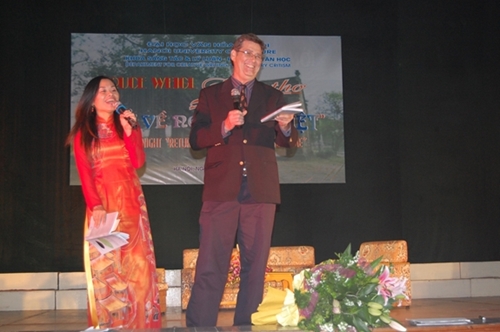In winter days of 2019, people noticed that everyday an American sit enjoying a coffee at sidewalk bar in Nguyen Du Street in Hanoi while taking notes on his small notebook. He is Prof. Bruce Weigl, who lives in a small rented apartment in Yet Kieu Street. During his stay in Vietnam this time, he planned to write a novel about Vietnamese traditional villages.
    |
 |
|
American poet Bruce Weigl at an program in Hanoi University of Culture |
During the Vietnam War, Bruce Weigl used to fight in Tay Ninh province. He then became an active member of the antiwar movement to call on the US Government to end the war in Vietnam. When the US-Vietnam relations remained frozen after 1973, he did his utmost to support the normalization between the two countries.
In the 1990s, many Vietnamese writers went to the US annually to join the summer literature conferences. Once while in Boston, the Vietnamese writers were surrounded and about to be attacked by overseas Vietnamese extremists after joining an event at the city’s library. At that time, Bruce Weigl stood up and used a handle for flag to protect them. He shouted out: “I am a marine. You are not allowed to touch my friends”.
He told that the Federal Bureau of Investigation (FBI) has ever called to ask him the reasons why he had gone to Vietnam so many times. He answered that if they want to know about Vietnam, they should go and see. The “pho” (noodle with beef) is very popular there and the consequences left by US bombs are very obsessive, he said.
Bruce Weigl is the first American poet who has ever translated a collection of Vietnamese poems into English and introduced it to US readers since 1987. The collection was entitled “Poems from the seized documents”. The poems were written by Vietnamese troops during the Vietnam War. He and me together with other American poets have co-translated the poem collection of “Rivers and mountains” and he has self-translated the collection of “Desire for peace”.
In recent years, he often stays for about three months whenever going to Vietnam. He said he hopes to stay in Vietnam longer. He also told me that his last dream is to find a final resting place in a rice field in Hanoi suburban area.
This reminds me of Prof. Dr. Judith Ladinsky, who had also wished to be laid in rest in Vietnam. Her wish was then completed by her daughter after she died in 2011. Judith was also an American, who had a special fondness for Vietnam.
She voluntarily went to Vietnam when the US Government was imposing sanctions on the country and did her best to support Vietnamese people to overcome the war-left consequences. Every time she went to Vietnam, she brought a lot of things with her such as medical tools, medicines, books, medical curriculum, and so on. Furthermore, she took Vietnamese doctors to the US for further training, and gave much valuable advice to the Vietnamese health sector. At that time, she is Chairwoman of the US Committee for Science and Technology Cooperation with Vietnam.
Like Prof. Kevin Bowen and Poet Bruce Weigl, Prof. Judith Ladinsky also got troubles with the country that she has devoted their special loves. When Vietnam was sanctioned by the US, Americans going to Vietnam were undoubtedly treated with suspicion. Some Vietnamese people even told me that they do not believe that Americans love Vietnam. Some even thought that they might be agents of the Central Intelligent Agency (CIA). Likewise, many Americans did not believe that the communists came to the US for a peaceful or goodwill purposes. I understand that is the nature of human beings, however, I do believe time can help us see and understand things right.
Until she died, Judith has gone to Vietnam a total of 120 times. It means she has been on 240 flights from the US to Vietnam and vice versa. Indeed, we should appericate and thank her because of what she has done for our country.
Since the very first days coming to Vietnam, she has worked with our best scientists, including Prof. Ton That Tung, Prof. Nguyen Van Hieu, Prof. Hoang Thuy Nguyen, and so on. These Vietnamese intellectuals have contributed significantly to the belief of Prof. Judith Ladinsky. I remembered she has once travelled by motobike in cold and rainy weather to visit her Vietnamese friends. To some extend, I could understand her but there is always a question in my mind: What makes a woman from a far-away country leave her family and her best living conditions to come to this land, to ride a motorbike on the last frigid days of winter?
On July 22, 2013, under the approval of the Government of the Socialist Republic of Vietnam, the Ministry of Science and Technology hosted an official ceremony to receive Prof. Judith Ladinsky's ashes, which was directly transported from Wisconsin by her daughter Morrisa Ladinsky and son-in-law Mitchell Cohen. Her ashes were later being buried at the Vinh Hang Cemetery in Hanoi. In recognition of contributions of the US humanitarian and health science professor to Vietnam, the Vietnamese Governement honored her with the Friendship Order and numerous prestigious awards.
For Bruce Weigl, he is living a real Vietnamese life. Sometimes, he repeated his touching-but-frightening offer: “I love this country and I wish to be part of it. When I die, please bury me in this field”. His offer made me realize that there have been such great friends who always love our country as so.
Translated by Trung Thanh